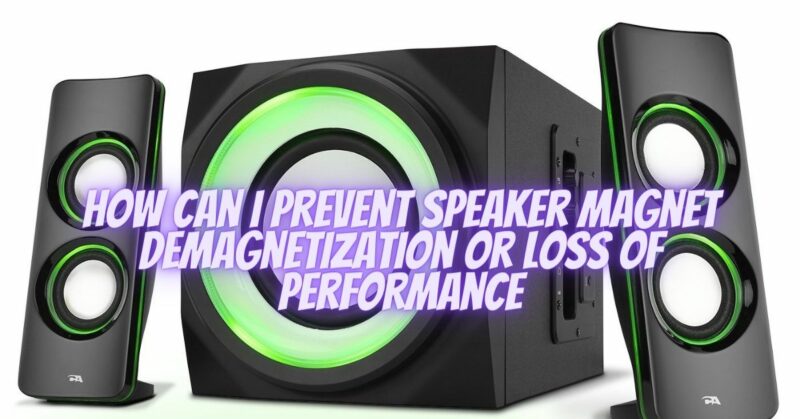Speaker magnets play a vital role in generating the magnetic field that drives the speaker cone, enabling accurate sound reproduction. However, over time, magnets can experience demagnetization or loss of performance, leading to compromised audio quality. To ensure long-lasting and consistent speaker performance, it is crucial to take measures to prevent magnet demagnetization. In this article, we will explore effective strategies to preserve speaker magnet performance and maintain optimal audio reproduction.
- Proper Handling and Storage:
Proper handling and storage of speakers are essential for preserving magnet performance. Consider the following guidelines:
a. Avoid Magnetic Interference: Keep speakers away from strong magnetic fields, such as large magnets, magnetic materials, or electronic devices that generate significant magnetic fields. Magnetic interference can disrupt the magnetic properties of the speaker’s magnets, leading to potential demagnetization.
b. Secure Transportation: When transporting speakers, ensure they are properly secured and protected from impacts. Vibrations and shocks can cause displacement of the magnets or compromise their alignment, affecting the speaker’s performance.
c. Temperature Control: Extreme temperatures can impact the magnetic properties of the speaker’s magnets. Avoid exposing speakers to excessive heat or cold, as this can lead to demagnetization or loss of magnetic strength. Store speakers in a climate-controlled environment to maintain stable temperature conditions.
- Amplifier and Signal Management:
Proper amplifier and signal management can help prevent speaker magnet demagnetization:
a. Avoid Overloading: Be cautious not to overload the amplifier, as excessive power or voltage can strain the speaker’s magnetic system. Ensure that the amplifier is appropriately matched to the speaker’s power handling capabilities to prevent excessive stress on the magnets.
b. Use Quality Amplifiers: Invest in high-quality amplifiers that provide clean power output without introducing distortions or clipping. Poorly designed or low-quality amplifiers can introduce excessive voltage spikes or uneven power delivery, potentially affecting the magnets’ performance.
c. Signal Clipping Prevention: Avoid driving the amplifier into clipping, which occurs when the signal exceeds the amplifier’s capabilities. Clipping can generate high-frequency distortion and voltage spikes that can stress the speaker’s magnets and lead to demagnetization.
- Regular Maintenance and Inspection:
Performing regular maintenance and inspections can help identify potential issues and address them promptly:
a. Visual Inspection: Periodically inspect the speakers for any signs of physical damage, such as cracks, impacts, or loose parts. Ensure that the magnet structure remains intact and that there are no visible abnormalities.
b. Cleanliness: Keep the speaker cabinets clean and free from dust or debris. Accumulated dust or particles near the magnets can interfere with their magnetic properties. Use a soft brush or compressed air to remove dust, being cautious not to damage any delicate components.
c. Professional Servicing: If you suspect magnet demagnetization or experience a significant decline in speaker performance, consult a professional audio technician or speaker specialist. They can assess the condition of the magnets and provide appropriate solutions or repairs if needed.
- Use Protective Speaker Grilles:
Using protective grilles can safeguard the speaker’s magnetic structure:
a. Speaker Grilles: When applicable, utilize speaker grilles or covers to protect the speakers from physical damage. Grilles can help prevent accidental impacts, which could displace or damage the magnets.
b. Acoustic Transparency: Ensure that the speaker grilles do not compromise the speaker’s acoustic transparency. Properly designed grilles should allow sound to pass through without significant attenuation or distortion.
Conclusion:
Preserving the performance of speaker magnets is crucial for maintaining optimal audio reproduction and avoiding potential issues such as demagnetization or loss of magnetic strength. By following proper handling and storage practices, managing amplifier and signal output, conducting regular maintenance and inspections, and using protective speaker grilles, you can significantly reduce the risk of magnet demagnetization. Take care of your speakers, and they will continue to deliver exceptional audio quality and faithfully reproduce your favorite music for years to come.


